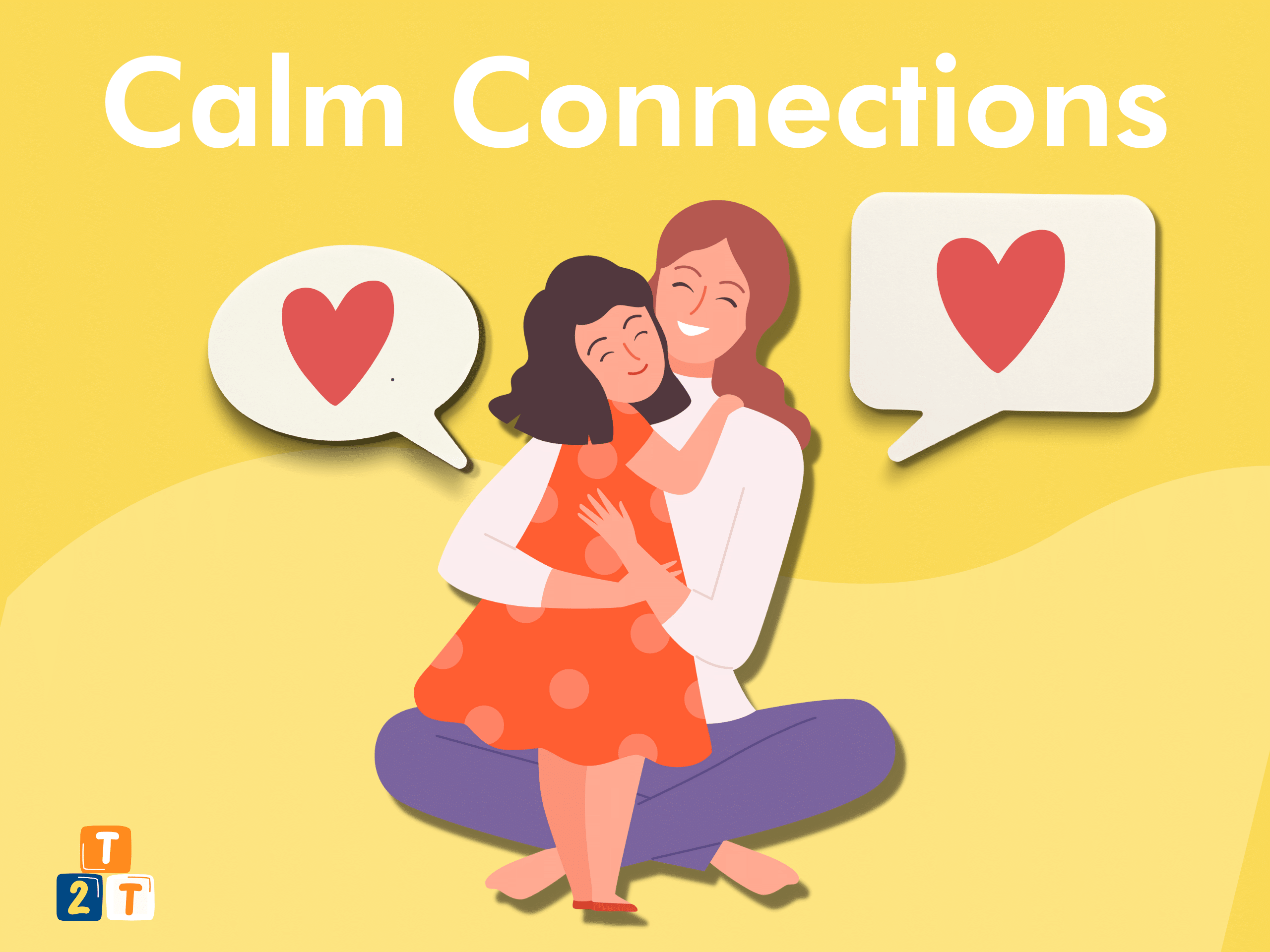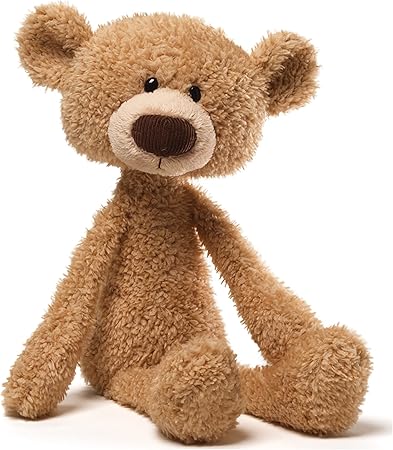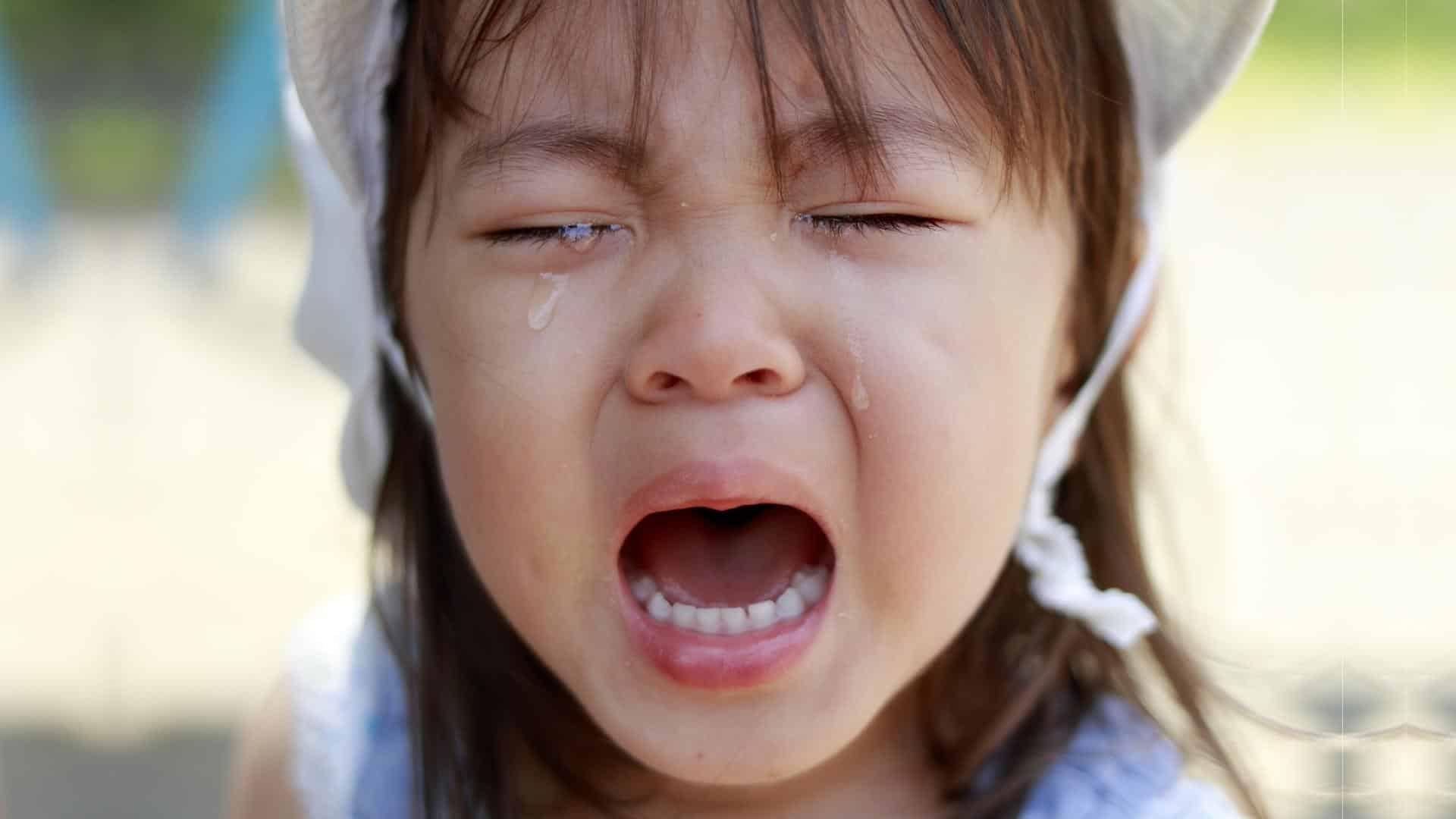Tantrums in 4-year-olds can be a parent’s worst nightmare. Have you ever felt helpless in the face of your child’s uncontrollable fits and outbursts?
In this article, we’ll explore the fascinating science behind tantrums in 4-year-olds and provide you with practical tips to prevent them from happening so you can say goodbye to public meltdowns and hello to a more peaceful life.

Table of Contents
What Is A Tantrum?
A tantrum is an eruption of emotion often born out of frustration or anger. They can result in your 4 year old kicking, screaming, hitting or biting to let out their frustrations and try to get what they want. They may also exhibit extreme behaviors such as throwing things and holding their breath for extended periods of time in protest too.
Are Tantrums In 4 Year Olds Normal?
Yes, tantrums in 4 year olds are a normal part of child development. They happen as your child learns to become more independent and typically occur between the ages of 1 and 4.
REMEMBER: Healthy children of all ages are capable of having a tantrum… but if tantrum-like behaviour is not handled properly, then their disruptive behaviours can continue for years to come.
How Do I Handle My 4 Year Old’s Tantrums?
Dealing with temper tantrums in 4 year olds is never easy, especially when they happen in public. But being prepared and having a list of strategies to deal with tantrums in 4 year olds is your best plan to get through them safely and effectively.
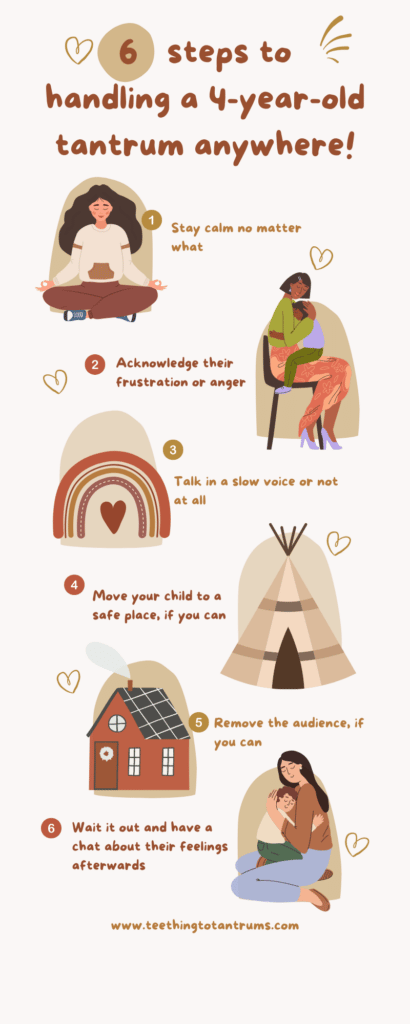
1. Stay calm no matter what. This is the hardest part of handling tantrums in 4 year olds. But taking a deep breath and staying calm is key to preventing a tantrum from escalating.
2. Acknowledge their frustration and anger. Tantrums usually occur when your little one feels ignored, unheard or misunderstood. So acknowledge their anger or frustration with minimal words.
3. Talk in a slow low voice or not at all. Use as few words as possible. Mid – tantrum, 4 year olds are looking for you to lose your temper and give them a reaction. Sometimes it is best not to say anything until the tantrum has passed.
4. Move your child to a safe place if possible. If you can, move to a safe place where your child cannot hurt themselves, you, anyone or anything else.
5. Remove the audience if possible. It can feel very embarrassing to have your child throw a tantrum in public so if possible, remove them from an audience. This allows you to concentrate on them without worrying about what others are thinking and very often, without an audience your little one’s tantrum will lose momentum.
6. Wait it out and chat about their feelings afterwards. You cannot force tantrums in 4 year olds to come to an end. Nor can you expect your toddler to listen to you in the middle of a tantrum. Therefore, wait it out and have a chat about what happened afterwards to help your 4 year old understand that there are more acceptable ways to express their feelings next time.
7. Don’t give in. And I mean NEVER give in to a tantrum. Even if part way through you feel you may have denied them something that they could have had or done… Once you have said ‘no’ you must see it through. If you give in to a tantrum you reinforce that this aggressive behavior gets results.
Want to stop your children from yelling, shouting & throwing tantrums... Whilst helping them listen to you and building a healthy strong relationship? Look no further than Calm Connections and transform your family’s life for years to come.
- Understand the best way to communicate with your child in different situations, so you feel more confident, relaxed, and in control... even during the most challenging moments. 💖
- Learn how to set clear boundaries and engage your child's cooperation 🌟
- Break free from tantrum cycles and promote healthy alternatives (without using punishment) 🎉
- Learn my trade secrets (collected over 40+ years in the childcare industry) to get your child to listen to you without shouting 🙌
- Promote kindness and honesty to prioritize a respectful relationship with your child ❤️
Common Mistakes You Must Avoid When Handling 4-Year-Old Tantrums
How To Prevent 4 Year Old Tantrums From Happening
Prevention is always better than reaction. And having some tricks up your sleeve to prevent toddler temper tantrums from happening in the first place is hugely beneficial for the whole family.
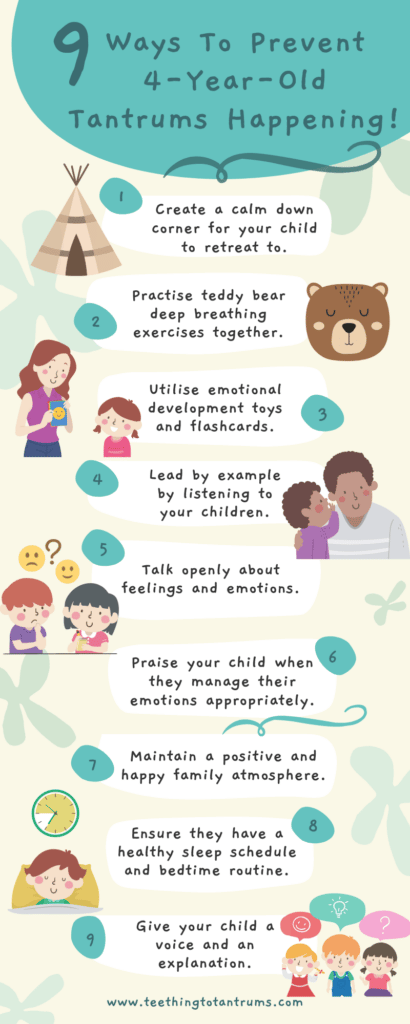
1. Create a calm-down corner. Having a safe space where your 4 year old can go when they feel things are getting too much can be hugely beneficial to help them reset their emotions. If you wish to leave your child to calm down by themselves for a short time, the American Academy of Pediatrics recommends a 1-minute “time out” for every year of your child’s age.
2. Practice teddy bear breathing. This is a fun way to get your little one to practice deep breathing which works wonders for preventing tantrums in 4 year olds. Balance a teddy bear on their tummy and give it a ride with the rising and falling of your child’s breath. It is a great idea to make this part of the bedtime routine when they are lying down in bed.
Super soft, very cuddly and the perfect companion to young children, the GUND Teddy Bears never fail to be toy box favourites for years to come!
3. Utilise emotional development toys, books and flashcards. These are excellent ways to get your little one to talk about their emotions in a healthy way. They will give you an insight into how your child is feeling and will give them the essential verbal tools to express themselves in a healthy way.
4. Lead by example by modelling good listening. Leading by example, giving your child positive attention and listening to them first will go a long way in avoiding unnecessary temper tantrums in 4 year olds.
5. Talk openly about emotions and feelings. If you talk openly about your feelings your child is more likely to do the same. It is important for them to realise that feeling angry, sad and frustrated is normal but that there are ways to process these emotions without having a tantrum. I love the Little Spot of Emotion Books to help address this topic with children.
What is it? This book contains 8 different plush toys each displaying a different emotion - Anger, Anxiety, Peaceful, Sadness, Happiness, Love, Confidence and Tangled (Scribble) - to help children identify and process their emotions.
Why do I like it? This is a very helpful tool to teach children about emotions and how to handle them. Its fun plush toys make learning about emotions manageable and approachable. The Little SPOT of Emotion book is also ideal for children with social-emotional needs.
6. Praise your child when they manage their emotions properly. When your child successfully processes or navigates a situation that could have resulted in a tantrum ensure that you give them plenty of praise and encouragement. Reinforcing a good outcome will definitely help to reduce temper tantrums moving forward.
7. Maintain a happy and positive family atmosphere. 4 year olds are very sensitive to their environment and the happier and calmer their surroundings are… the fewer tantrums they will have.
8. Ensure your child has a healthy age-appropriate sleep schedule and regular bedtime routine. Sleep and emotional behaviour go hand-in-hand. Help your child to maintain a consistent sleep schedule and bedtime to limit the possibility of overtiredness causing any tantrums.
9. Give your child the words to express their feelings. Very often, severe tantrums in 4 year olds are a result of your child’s inability to vocalise how they are feeling. Make sure there are plenty of opportunities for your 4 year old to talk about their emotions and give them the words to express themselves.
Looking to get your little one to sleep quickly and effortlessly? Check out my Bedtime and Nap Cheat Sheet and master the art of making daytime naps and bedtimes as seamless as possible.
A bedtime & nap cheat sheet so good your little one will ask you to put them to bed...
Laura Williams "This is a life saver! I'm so glad I downloaded your bedtime & nap cheat sheet. My little one actually asked me to put him to bed last night! Unbelievable! Thank you so much!"
Click Here For The FREE Cheat Sheet
What Is The Difference Between A Tantrum And A Meltdown?
The main difference between tantrums in 4 year olds and meltdowns is that:
- A tantrum is a result of frustration or anger, where your child will still have some element of control over their behaviour and the tantrum will usually end once they have got what they want.
- And a meltdown is a result of emotional or sensory overload, where your child will struggle to calm down and will only do so once they have been removed from the situation that caused the meltdown in the first place.
However, some tantrums can turn into meltdowns if they go on for a long time…
Characteristics Of A Tantrum:
- Temper tantrums in 4 year olds are goal-driven
- Your child will remain partially communicative
- They are a normal reaction to feeling frustrated, angry or not getting their own way
- They are driven by a desire for attention or a result of not being able to fully communicate what your child wants
- They remain under the child’s control
- Children will watch to see what your reaction is
- Children will yell but be able to negotiate
- Stop once your child’s goal has been achieved
- Your child can recover quickly once the tantrum is over
Characteristics Of A Meltdown:
- Meltdowns are not goal-driven
- Children are less verbal and communicative
- Meltdowns are an instinctive reaction to feeling overwhelmed or being unable to handle strong emotions such as fear, anxiety or sensory overload
- They are out of a child’s control or ability to reason
- They are usually long-lasting
- Meltdowns are often something children will not grow out of
- Children will not be able to process what is going on around them
- Children will not be able to negotiate with you
- They will struggle to calm down
- Children will often become withdrawn once a meltdown has ended
TOP TIP: If you suspect that your 4 year old is experiencing meltdowns instead of tantrums, click here to get specific advice on how to handle emotional meltdowns in young children.
Frequently Asked Questions About Tantrums In 4 Year Olds
Need more advice about temper tantrums in 4 year olds? Get the answers to the most common questions here:
Is It Normal For A 4 Year Old To Be Emotional?
Yes, it is normal for a 4 year old to be emotional. This is because your 4 year old is starting to learn about other people’s feelings and has a strong desire to please and be seen as good and kind. They will also start to form friendships and learn the whole range of emotions that go with this.
In addition, they will be developing their imagination and with so much going on you can expect your 4 year old to have emotional outbursts as they try to process all these new feelings.
How Can I Stop My Four Year Old’s Tantrums And Hitting?
If your 4 year old is hitting out when they have a tantrum you need to take swift action and address the issue. Make sure that your 4 year old knows that hitting is never allowed by saying ‘No hitting. Only respectful touches are allowed.’
If your child is uncontrollably hitting, hold them firmly from behind, keeping their arms by their side and say that you will only let go once they calm down.
Once the tantrum has passed, talk about how hitting people is not an acceptable way to behave and offer them alternative options like hitting a cushion when they feel angry and using words to express their frustration and anger.
TOP TIP: If your 4 year old persists with violent tantrums you should seek a child psychologist as an emotional assessment may be necessary to rule out any underlying conditions that may be contributing to their behaviour.
When To Seek Help For Tantrums In 4 Year Old
In some cases, temper tantrums in 4 year olds can be an indication of an underlying condition linked to the child not being able to process emotions effectively.
If you notice any of the following signs, or if your child is regularly engaging in specific types of tantrum behaviors, then I would advise having a chat with a medical professional to see if an emotional assessment would be useful:
- Tantrums happen more often, are getting worse and last longer.
- Your child struggles to calm down after an outburst
- Tantrums regularly last longer than 15 minutes.
- Your child tries to hurt themself or others.
- Your child always opposes you, argues a lot and hardly ever cooperates with you even when given acceptable choices.
Why Does My 4 Year Old Keep Having Tantrums Every Day?
Your 4 year old may keep having tantrums every day because they are:
- Struggling to vocalise what they need.
- Feeling frustrated at not being able to do something (like finish a puzzle or stopped from going to the park)
- Tired.
- Hungry.
- Wanting attention.
While these are the most common triggers if your little one suddenly starts throwing more frequent tantrums than normal… they may also be feeling insecure about a recent change in their life such as starting nursery, moving house or the arrival of a new sibling.
What Do You Do When You 4 Year Old Screams At You?
Firstly, don’t ever scream back or verbally discipline your toddler when they’re throwing a tantrum. They are screaming at you to get a reaction… so the most powerful weapon you have is not to react.
Keep your voice calm and refuse to talk about the issue until they bring down the volume and use their ‘quiet’ voice. Encourage them to come and sit in the calm-down corner where you can help them express their feelings in an acceptable manner with positive behavior.
It is important that you take this time once the screaming has stopped to reinforce that they will have your attention if they speak and behave respectfully.
REMEMBER: Your 4 year old is learning a lot about feelings and you need to spend time helping them process these feelings in a regulated manner.
Is Attention Deficit Hyperactivity Disorder To Blame?
You will only know if attention deficit hyperactivity disorder (ADHD) is contributing to tantrums in 4 year olds if you consult a child development psychologist or child development expert.
Further Reading
Toddler tantrums are a normal part of childhood, but they should not be dominating your life. Read these articles to help you better understand and manage temper tantrums in a healthy and productive way:
- 2 Year Old Tantrums
- 3 Year Old Tantrums
- 4 Year Old Tantrums
- 5 Year Old Tantrums
Need More Parenting Help?
- Download our FREE Bedtime & Nap Sleep Cheat Sheet. It’s a free, easy-to-use and proven formula designed for parents of 0-5 year olds to master the art of consistently undisturbed and restful sleep without the yelling, nagging or exhausting long-winded evenings.
- Check out our Parenting Toolbox. You’ll get access to expertly-chosen products that you can guarantee are the best for your little one and your wallet.
- Are you looking for personalized guidance to navigate the challenges of parenting? I offer 1-on-1 consultations to bring you tailored strategies and actionable advice to help support your child's growth and well-being with confidence.

A bedtime & nap cheat sheet so good your little one will ask you to put them to bed...
Laura Williams "This is a life saver! I'm so glad I downloaded your bedtime & nap cheat sheet. My little one actually asked me to put him to bed last night! Unbelievable! Thank you so much!"
Click Here For The FREE Cheat Sheet
